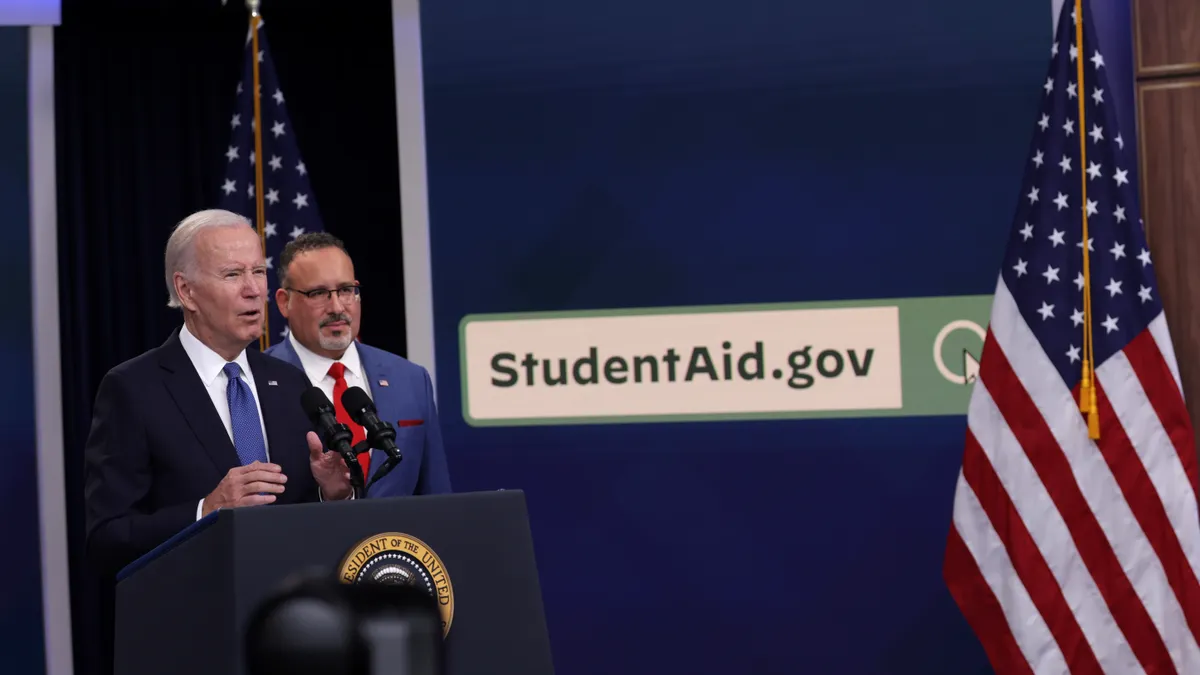Dive Brief:
- An auditor for the U.S. Department of Education declined this week to offer an opinion on the agency’s fiscal 2022 finances, raising concerns with how the Biden administration calculated its student loan debt forgiveness program last year.
- KPMG in a report said Education Department officials did not “provide adequate evidential matter to support certain key assumptions” related to the cost of the debt cancellation plan, which is stalled in court. The plan calls for wiping away up to $20,000 in debt for borrowers earning up to $125,000 a year.
- The Education Department partially concurred with KPMG’s findings but maintained that it figured out the program’s cost and how many people would take advantage of it using “relevant research literature” and take-up rates from other federal benefits programs.
Dive Insight:
Questions have swirled about the cost of President Joe Biden’s plan to wipe away mass chunks of student loan debt, which court rulings temporarily halted. The U.S. Supreme Court will hear oral arguments in lawsuits against the plan Feb. 28.
Some estimates suggest it could cost the federal government hundreds of billions of dollars over the next decade. The Education Department estimated costs will be $379 billion over 30 years, while the nonpartisan Congressional Budget Office projected $400 billion over that timeframe.
The forgiveness program seems to have so severely thrown the Education Department’s finances into question that for the first time in at least 20 years the agency did not earn a clean audit.
KPMG took particular issue with the Education Department’s modeling of how many people would participate in the debt cancellation plan. Auditors wrote the department’s processes “were not properly designed at an appropriate level of precision” to validate data used to gauge the take-up rate, and thus the cost, of the program.
“As a result, the documentation over the subsidy cost estimates in the financial statements was not supportive to evidence the estimate calculations,” they wrote.
Officials at the Education Department and U.S. Office of Management and Budget reviewed and approved the cost estimates, according to the report. The Education Department gave a response published in the auditor's report saying it constructed these processes correctly. But it did “acknowledge that controls may have not operated as intended due to lack of strictly comparable other federal benefit programs.”
It said it would take KPMG’s feedback and improve how it calculates loan costs.
An Education Department spokesperson said Thursday that officials based estimates for the loan program on information available to them at the time. The department is not accepting applications for debt relief and therefore “has not been able to use concrete application data to demonstrate the accuracy of its estimated take-up rate,” the spokesperson said.
The spokesperson said the department officials “look forward to prevailing” in the Supreme Court so it can allow eligible borrowers to apply for relief and in turn give auditors the accurate take-up numbers.
Shortly after the auditor’s report began circulating, Rep. Virginia Foxx, a North Carolina Republican and chair of the House Education and the Workforce Committee, began blasting the Education Department.
She accused officials of “blatantly lying.” KPMG did not say in its report that the department misrepresented its finances.
“This auditor said it wouldn’t touch the Department’s shoddy guesses with a ten-foot pole let alone sign off on them,” Foxx said in a statement. “This is absolutely ridiculous.”










